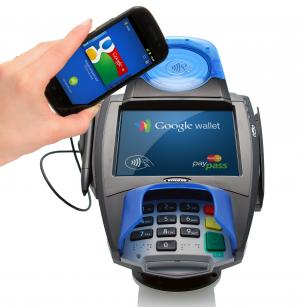Has Google Wallet Already Failed?
Businessweek ran an article today in which it assesses the current state of Google’s Wallet efforts. Osama Bedier, who came from PayPal and ran the Google Wallet initiative, is leaving the company. And, Google is rethinking its expectations of Wallet. Google Wallet is the consolidated product name for all stored credit card transactions online and […]
 Businessweek ran an article today in which it assesses the current state of Google’s Wallet efforts. Osama Bedier, who came from PayPal and ran the Google Wallet initiative, is leaving the company. And, Google is rethinking its expectations of Wallet.
Businessweek ran an article today in which it assesses the current state of Google’s Wallet efforts. Osama Bedier, who came from PayPal and ran the Google Wallet initiative, is leaving the company. And, Google is rethinking its expectations of Wallet.
Google Wallet is the consolidated product name for all stored credit card transactions online and on mobile devices. Google’s merchant credit-card processing service for ecommerce (once called Checkout) is being discontinued.
The company also declined to introduce a plastic payment card at its Google I/O developer conference. That payment card was widely expected and set to follow a similar, earlier payment card introduction from PayPal.
According to the Businessweek article, Google has spent hundreds of millions of dollars on Wallet-related acquisitions and development but has relatively little to show for it in terms of consumer adoption. Google told Businessweek it remains committed to the product.
Unexpectedly, the company has also been blocked by carriers who offer a rival NFC-based mobile payments platform: ISIS. (ISIS itself is destined for failure.) Accordingly, very few US Android users can actually use Google Wallet in the offline world.
There are lots of impressive mobile payment and mobile wallet revenue forecasts in the market (see, e.g., Gartner). Most of them are terribly inflated (except for developing market money transfers and banking).
Having said that, there are already billions of dollars flowing through mobile-initiated ecommerce and financial transactions or iPad-based point-of-sale terminals. However, consumer adoption of “mobile payments” (other than banking and bill paying) is limited. In certain specific contexts, such as the Starbucks app or parking apps (e.g., PayByPhone), payments on mobile devices are happening.
Google’s bet on NFC was premature. Plus, the company didn’t expect rivals to aggressively block the product. There are millions of NFC and Google Wallet-enabled Android handsets out there, but the barriers erected by US carriers combined with low consumer awareness have thwarted Google Wallet adoption and usage (in the real world).
Even the comScore survey results above may be overstated in terms of Google Wallet awareness. Certainly, the usage numbers are not representative of the mobile population at large: half of Americans have not used PayPal as a “digital wallet,” though half of US adults may well have used PayPal at one time or another online.

Indeed, PayPal is the only mobile payments provider with any real consumer awareness. Recently, the company conducted a global survey (n=1,000) that claims to show broad consumer demand for mobile wallets:
Overall, the data that came back showed that what people want most of all is to lose their wallets. In every country we surveyed, at least 3 of 4 respondents said they wished they didn’t have to carry their wallets around with them. A vast majority (83%) of respondents across five countries said they wished they didn’t have to carry a wallet. Additionally, nearly one in three Americans (29%) would choose a smartphone over a wallet if they could only bring one item when going out.
The term “mobile payments” means different things to different people. Make no mistake: payments initiated by smartphone (whether bill paying, money transfers, offline transactions in stores or ecommerce) will take hold and become a major phenomenon worth billions annually. It’s just taking much longer for that to happen than people earlier anticipated.
Google Wallet will no doubt endure — you pay for mobile apps and movie rentals online with Wallet. However, the grand vision of Google Wallet as a physical wallet replacement doesn’t appear to be realized any time soon.
Contributing authors are invited to create content for MarTech and are chosen for their expertise and contribution to the martech community. Our contributors work under the oversight of the editorial staff and contributions are checked for quality and relevance to our readers. MarTech is owned by Semrush. Contributor was not asked to make any direct or indirect mentions of Semrush. The opinions they express are their own.
Related stories
New on MarTech